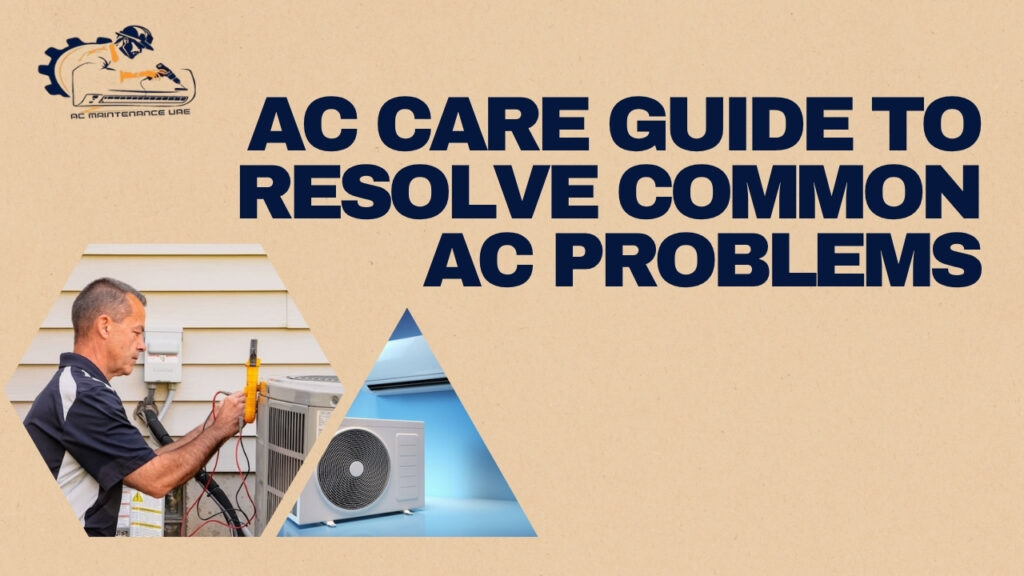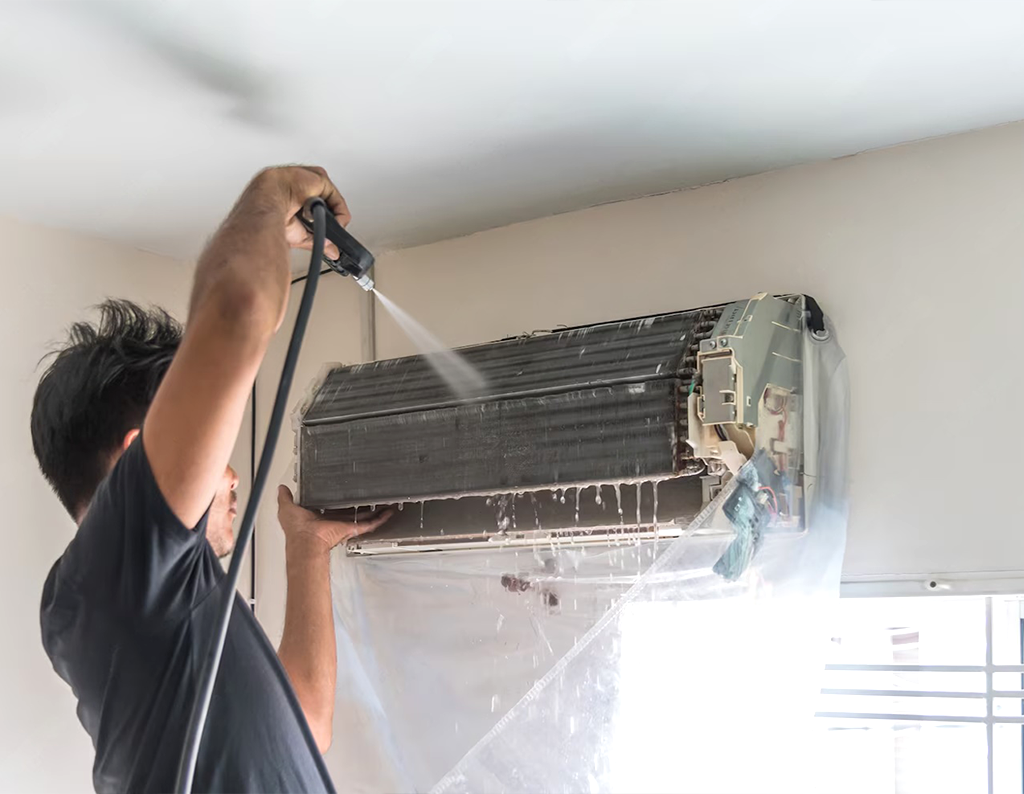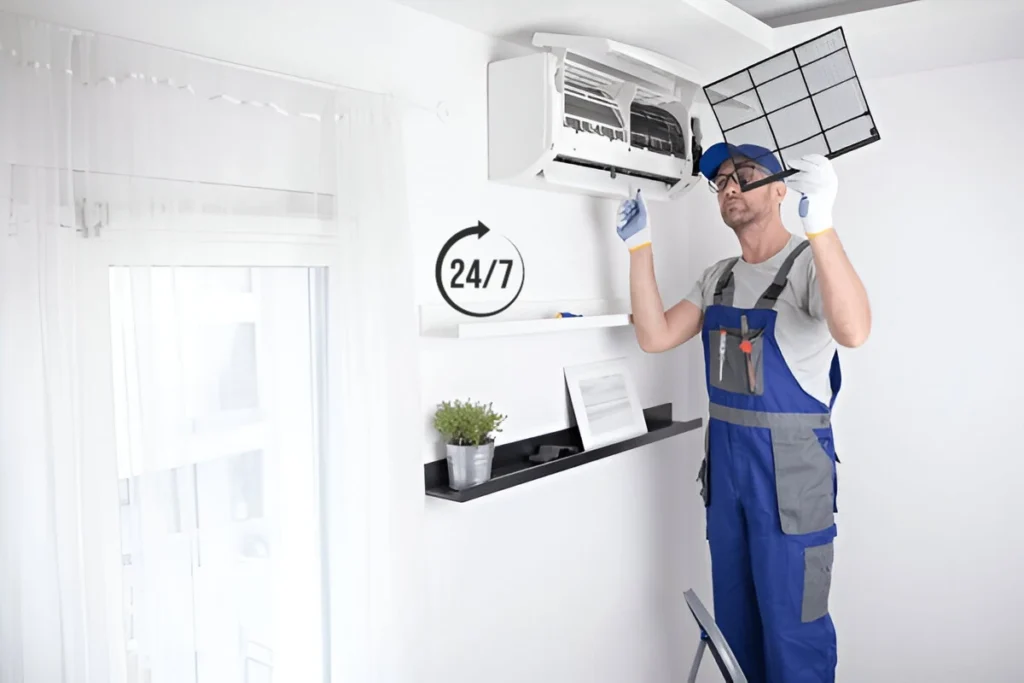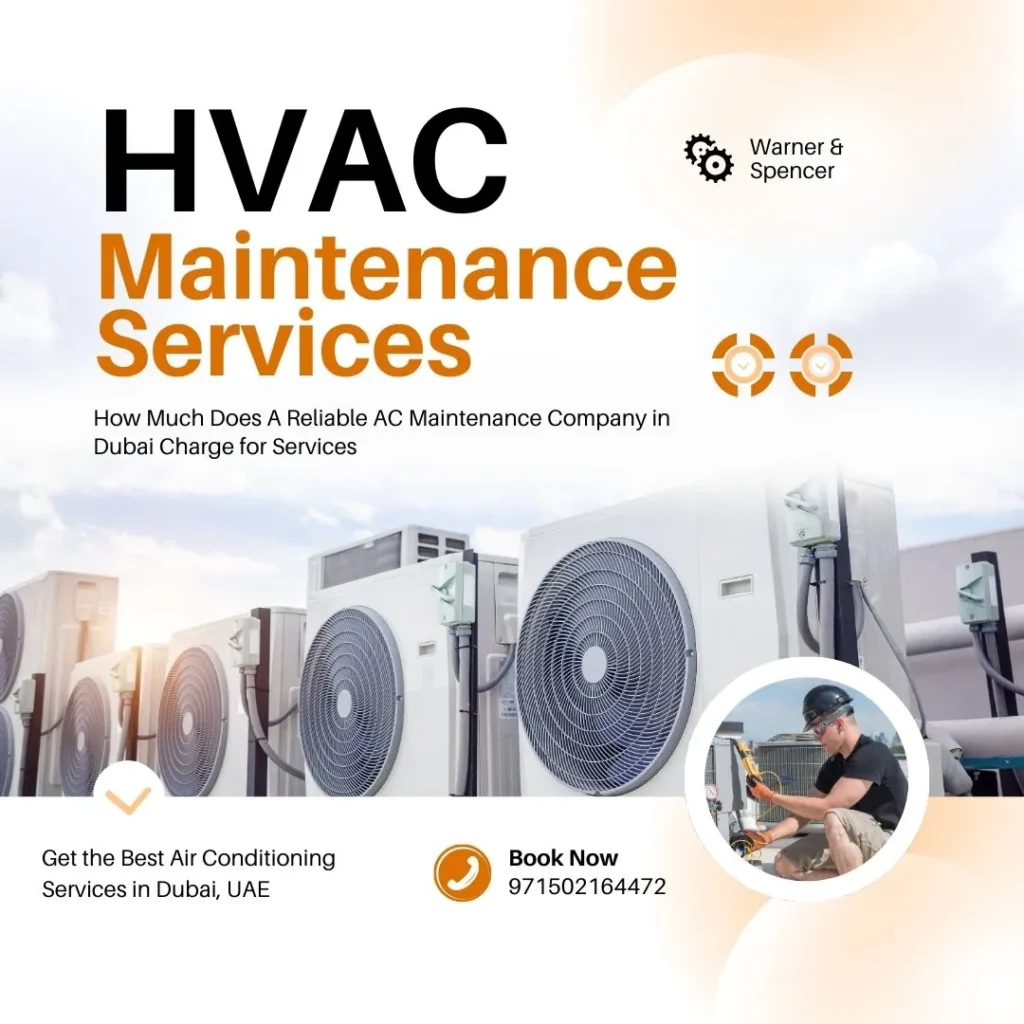Is your air conditioning system breaking down when you need it the most? With everything from lukewarm air to unusual noises, common AC problems can disrupt your comfort and increase your energy costs. This guide will show you viable solutions to troubleshoot and repair the common issues you may experience so that you can have cool, efficient airflow once again as soon as you can.
Understanding Common AC Problems
Air conditioning units are durable, but like anything else, they wear out with time. Knowing and understanding common AC problems can help you act quickly, saving money on repairs and preventing complete system failure. Whether you can perform simple fixes on your own or have to involve professionals like us, AC Maintenance UAE, it makes all the difference when you know what to look for.
Why Regular AC Maintenance Matters
Keeping your air conditioning system serviced year-round will ensure that it runs efficiently and effectively. Preventive maintenance will identify minor problems before they become major unexpected costs. Simple actions like changing your filter and cleaning your coils can add years to the life of your system.
Benefits of regular maintenance:
- Better efficiency and lower electric bills
- Fewer failures and breakdowns when your system is used most
- Better indoor air quality for your family
- More life to your equipment
Key components affecting AC condition
There are several problems related to your AC not functioning properly. Refrigerant leaks, electrical issues, and airflow obstructions are at the top of the list. Detection of symptoms early will help you address issues before they become expensive fixes.
AC Blowing Warm Air: Causes and Fixes
When your ac blowing warm air, it defeats the purpose of running the system at all. This maddening problem is normally caused by an issue with the refrigerant, dirty parts, or just the thermostat settings. The good part is that most problems have easy and sometimes even inexpensive solutions you can complete on your own.
Low refrigerant means your ac can’t absorb heat. Dirty condenser coils won’t allow heat to be released, causing your system to work harder without the cooling. In fact, sometimes the best solution is just to switch your thermostat from heating to cooling.

Simple Troubleshooting Steps for Warm Air Issues
First, try out these quick checks before calling for help:
- Check the thermostat settings: Ensure it’s set to “cool” with the temp set lower than the temp in the room.
- Check the outdoor unit: Clean debris, leaves, and vegetation within two feet of the condenser.
- Check the air filters: Change dirty/clogged air filters (we’ll cover this more below).
- Check the circuit breaker: Reset any tripped breakers for your AC.
If your “ac blowing warm air” follows these steps, you most likely have a refrigerant leak or a compressor problem that needs professional servicing.
AC Compressor Failure: Signs and Prevention
The compressor serves as the heart of your air conditioning system, circulating refrigerant throughout the system. AC compressor failure is one of the most severe and costly problems you will encounter. When you are familiar with potential warning signs, you can be proactive instead of waiting for a total failure.
Some signs of trouble could be hard starting, loud grinding sounds, or tripping the circuit breaker. The unit could be running without cooling, or not starting at all. The compressor can be damaged from age, electrical issues, or refrigerant issues.
Common Indicators and Maintenance Tips
Watch for these indicators of difficulties:
Issues with start-up or cycling on and off constantly
A loud clanging or the sound of squealing or grinding coming from the outside unit
The breaker trips when AC is attempting to start
Warm air is coming out the vents, while it is running and running
Before compressor failure occurs, do the following:
- Get an annual professional tune-up: The technician will check your refrigerant levels and your electrical connections.
- Keep your outdoor unit clean: Regularly remove debris and hose off the coils at least once a month while running the cooling system
- Don’t disregard minor problems: Strange noises or diminished performance should be addressed as soon as possible.
- Change filters regularly: A clogged filter will force the condenser unit to work harder.
AC Not Turning On: Troubleshooting Made Simple
There’s not much worse than an AC not turning on during a heatwave. While it doesn’t feel like it, it’s very common for an air conditioning unit to stop operating! Additionally, you can relax knowing many causes are usually fairly easy to fix. Invisible problems like power failures, thermostat issues, and safety switches can all create silent systems.
Let’s break it down! Your air conditioning unit won’t turn on if there is no power going to the unit or if the internal safety mechanisms are at work detecting an issue. Most “dead” air conditioning calls are a result of tripped breakers, blown fuses, or an incorrect thermostat setting. Taking a systematic approach will soon identify the overall problem.
Power, Thermostat, and Circuit Checks
To begin your diagnosis, please do the following:
- Check the thermostat: Make sure batteries are replaced, the unit is set to “cool,” and the temperature is set lower than room temperature.
- Check the circuit breakers: Check the main panel and any disconnect box close to the outdoor unit.
- Look at the furnace switch: This wall switch, close to your indoor unit, is often thought to be a light switch.
- Inspect the condensate drain pan: If the drain pan overflows, a float switch will activate, which will turn off the cooling unit.
If your ac not turning on after these four steps, the problem is most likely related to a failed internal component (capacitor, contactor, or control board) that will have to be repaired by an HVAC technician.
AC Unit Freezing Up: Reasons and Quick Solutions
When your air conditioning unit freezes up, it will form a solid block of ice on your indoor evaporator coils, completely blocking airflow. This may seem like an odd problem to have, but it is more common than you would think. Airflow restrictions, refrigerant issues, and mechanical failures will all cause ice to build up, stopping your cooling system from cooling altogether.
When warm, humid air is unable to flow across a set of cold evaporator coils, condensation will freeze instead of draining away. As the ice layer becomes larger, the airflow becomes even more restricted. This creates a vicious cycle. At that point, you may notice weak airflow, water leaking, or your AC running and not cooling.
How to Prevent a Frozen AC Unit
- If you see ice, take these immediate steps:
- Turn the AC off immediately: Running it in its frozen state will cause more damage.
- Switch the fan to “on”: The fan will blow ambient air, and that will help to melt the ice more quickly.
- Change the air filter: A lack of airflow is the number one cause.
- Check all supply vents: To be sure they are all open and unobstructed.
You can prevent an ac unit freezing up with maintenance:
- Remember to change your filters every 30-90 days, depending on usage.
- Keep all supply vents and return vents clear of furniture or drapes.
- Have a professional clean your coils every year.
- Fix any refrigerant leaks right away.
Air Conditioner Making Noise: What It Means
An air conditioner making noise beyond normal operation means something is wrong. Air conditioning units don’t just sit there silently, and some loud new sounds still shouldn’t happen. Once you identify the sound. You will be able to identify the major issues endemic to the air conditioning equipment and what to do about them.
Different sounds explain what kind of problems you are experiencing. A “squealing” sound would indicate an issue with the belt or motor bearings, banging sounds will mean a loose or broken internal component, hissing would likely mean a refrigerant leak or compressor valve issue, and buzzing means electrical issues or loosely attached parts.
Common Sounds and Their Causes
Decode your air conditioning unit sounds.
- Squealing or screeching: Worn motor bearings or a belt issue that will need lubrication easily or replacement.
- Banging or clanking: Loose parts, broken fan blades, or internal compressor components failing.
- Hissing or bubbling: Refrigerant leak or compressor valve issues.
- Buzzing: Electrical issues, loose wiring, or failing contactors.
- Clicking repeatedly: Relay or control board issue, which will not let the cooling unit start up correctly or normally.
Never ignore an air conditioner making noise. While it could be just a minor noise, it could lead to serious problems that could multiply rapidly causing complete system or equipment failure or an expensive repair bill. Act on any noise that is unusual, loud, or a new sound.
Air Conditioner Dust Filter: The Key to Smooth Airflow
Your air conditioner dust filter serves as the primary barrier against airborne particles. This small component has a surprising impact on system performance, energy efficiency, and indoor air quality. Ignoring the required maintenance is by far the most common reason an AC system fails.
Clogged filters impede airflow and force your system to work harder, albeit with less cooling. Your air conditioner runs longer cycles, your energy bills increase, and the internal components wear out faster. Dust and debris can even work their way around dirty air filters, covering the coils and internal manchester with grime, further reducing efficiency.
Cleaning and Replacement Tips
Filter maintenance schedule:
- Every 30 Days: Pets, allergies, or using the air conditioner all the time.
- Every 60 Days: Average homes during the cooling season.
- Every 90 Days: Little use or weekend homes.
Steps for filter maintenance:
- Find the filter: They can generally be found at the return air grilles and/or in the air filter cabinet.
- Identify the size and type: The information will be on the filter frame.
- Buy a suitable replacement: Pick the exact size; if you decide to go with a higher MERV filter, please keep in mind it will filter more air, but also restrict airflow.
- Properly install the filter: Look for the arrows in the frame to direct proper airflow.
Keep spare air conditioner dust filter units on hand, and you will never be stuck without a replacement. Set reminders for yourself to check the filters; it may be easily forgotten, but it is one of the most critical responsibilities you are charged with.
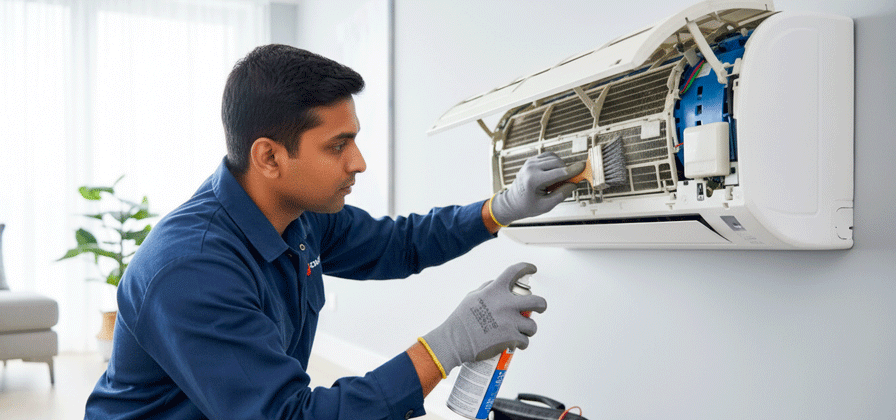
When to Call a Professional vs. DIY Fixes
It’s better to know when to fix things yourself and when to call for help. Homeowners can do simple maintenance tasks, but trained technicians with the right tools and knowledge are needed for more complicated repairs.
How to Figure Out What You Can Do Yourself
Secure Do-it-yourself tasks include:
- Cleaning outdoor units and changing air filters
- Setting circuit breakers back to their original state
- Checking and changing the thermostat settings
- Cleaning up around the outdoor condenser
- Cleaning up dust that can be seen on open vents
Let the pros handle these:
- Handling refrigerant and fixing leaks
- Replacing electrical parts
- Fixing a compressor or motor
- Changes to the ductwork
- Any job that needs to take apart the system
Why Professional AC Service Ensures Long-Term Reliability
At AC Maintenance UAE, we have trained technicians on diagnostic tools that help them find problems before they cause breakdowns. We know how to handle refrigerants safely, test electrical parts safely, and find problems that homeowners can’t see.
Annual professional service stops 95% of possible failures before they happen. Technicians clean parts inside that you can’t reach, measure how well the system works, and make changes that bring it back to factory efficiency.
FAQs
Q1) Why does an air conditioner blow warm air?
Warm air is caused by low refrigerant levels, dirty condenser coils, or wrong thermostat settings. If refrigerant is leaking, a professional needs to fix it.
Q2) What makes an AC compressor stop working?
Compressor failure can be caused by electrical problems, refrigerant problems, not keeping up with maintenance, age, and dirty coils that make the unit overheat.
Q3) Why isn’t the air conditioner working?
The most common reasons are tripped circuit breakers, dead thermostat batteries, blown fuses, and full condensate drain pans.
Q4) What makes the AC unit freeze up?
Dirty filters, blocked vents, or low refrigerant can all stop air from flowing, which can cause ice to build up on the evaporator coils.
Q5) What does it mean when the air conditioner makes noise?
Strange noises can mean that there are mechanical or electrical problems, such as worn bearings, loose parts, refrigerant leaks, or broken electrical parts.
Q6) How often should you clean the dust filter on your air conditioner?
Change out disposable filters every 30 to 90 days, depending on how often you use them. If you have pets or allergies, you should change them every month.
Conclusion: Keep Your AC Running Efficiently
Knowing what common AC problems are will help you keep your system in good shape and fix problems before they get worse. Most problems can be avoided by changing the filters regularly, cleaning the outdoor unit, and getting professional service once a year. When things go wrong, methodical troubleshooting usually finds simple fixes.
Now that you know how to spot and fix these common problems, are you ready to enjoy worry-free cooling all season? If you want your system to work at its best, call AC Maintenance UAE. [Schedule your AC tune-up today]
AC Maintenance UAE Team
Welcome to AC Maintenance UAE, your reliable partner for complete air conditioning repair and maintenance services in Dubai, Sharjah, and Abu Dhabi. We are strongly dedicated to excellence and deliver efficient and reliable services to keep your cooling systems performing at their best.

